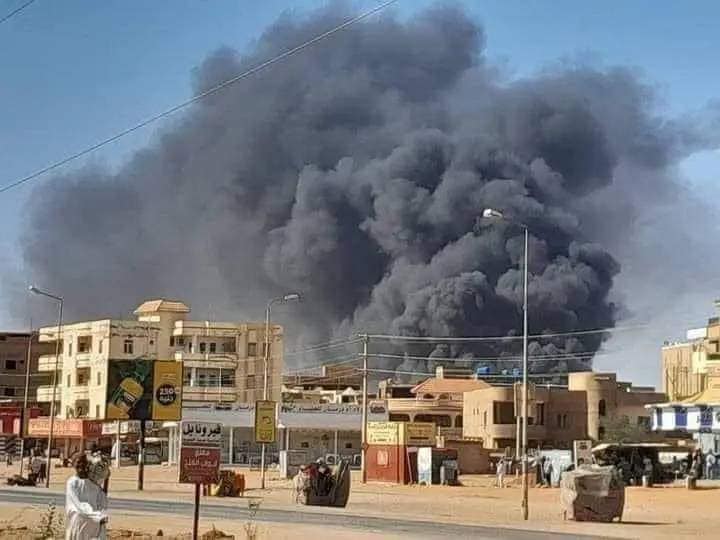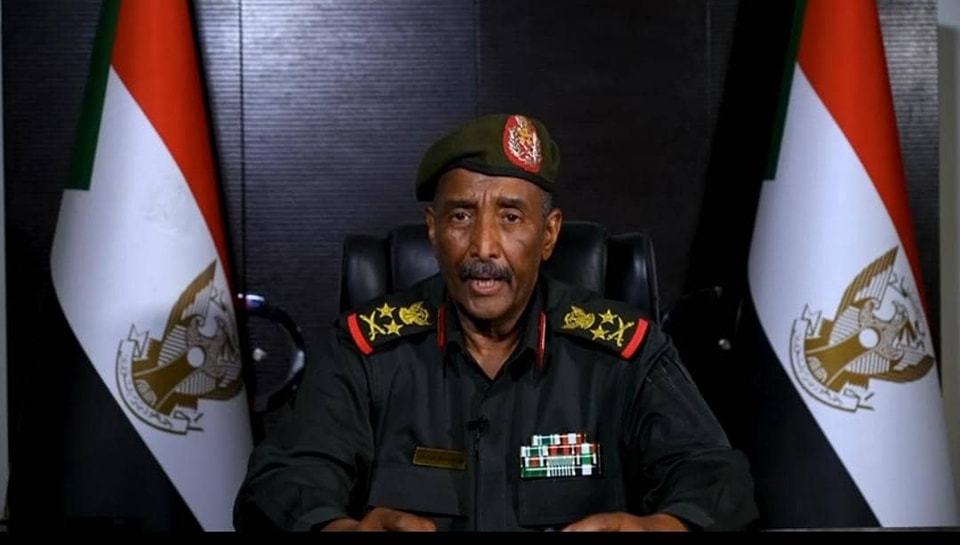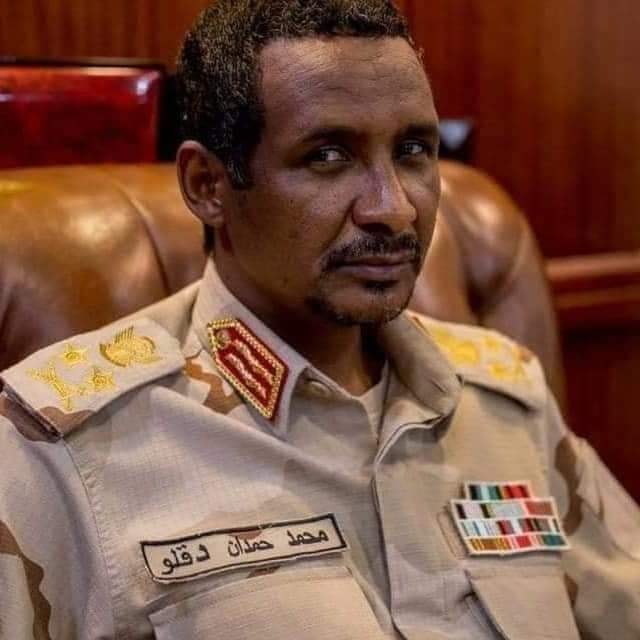
East Nile Hospital, Khartoum. It was bombed on 14 May allegedly by the SAF who believed it to have been a converted RSF barracks. Photo courtesy: ‘Sudan Armed Forces’ on Facebook.
At 10 am on the second day of fighting in Khartoum, I called my aunt in her village close to Shendi, 150 km north of Khartoum. I wanted to know about her eldest son, a sergeant recently transferred from Shendi garrison to Army HQ in Khartoum. The anxiety was eating her up. He hadn’t called since the fighting started, and his phone was switched off. I told her not to worry; lack of communication is normal during fighting. She had been with him in Khartoum, four days before the fighting began. He had told her to leave the capital immediately without giving any reasons. She sensed that he knew something grave.
That night, my sister called from Saudi Arabia. It was 8:00 pm, Paris local time, half an hour before Ramadan Iftar.
“The boy was killed in today’s attack on the HQ.”
Abdel Fattah al-Burhan and his nemesis Mohamed Hamdan Dagalo ‘Hemedti’ knew that their forces would eventually clash. Together they carried out the 3 June, 2019 sit-in massacre in cold blood. Hemedti’s Rapid Support Forces, on instructions from Burhan, massacred, raped and burned hundreds of civilian Forces of Freedom and Change protesters in front of the Army HQ in Khartoum. To conceal the crime, the soldiers weighed down the corpses with stones and threw them into the Nile. Burhan and Hemedti jointly planned their escape from accountability by staging the coup d’état in October 2021. At the time, I wrote about the desperate move, which sowed the seeds for the current tragic situation.

Gen. Abdel Fattah al-Burhan. Photo courtesy SAF.
A lot has been said about the two generals’ ascent to power after the ousting of Bashir and the power-sharing formula they devised to suit their mutually conflicting interests. The feud, at its core, is a battle between the military insider, in control of a crony system of kinship, ethnic and class alliances, and Hemedti, the outsider, from the provinces, and of dubious citizenship. Once merely an instrument of the Bashir regime, he has steadily accumulated power, wealth and regional alliances by astutely wielding his most effective weapon: the 70,000-strong RSF militia.
Derided for his lack of education, lowly background, even his accent, he has discovered that behind the uniforms, the Alkaizan – the network of al-Bashir’s ousted NCP Islamists – is still very much in charge.

Mohamed Hamdan Dagalo ‘Hemedti’.
Cessation of hostilities, not a ceasefire
The unfolding scenarios seem bleak. A month into the fighting and over 600 dead, the ongoing talks in Jeddah, underwritten by the Saudis and backed by the Americans, are negotiations over humanitarian corridors and civilian relief. They do not suggest any appetite on either side, for a retreat from the conflict.
In the four previous ceasefire negotiations, proposals were not accompanied by a cessation of military activities such as deployment of troops and relocations, leading to the renewal of violent clashes to curb each party’s preparations for another round of fighting. Even now, there is no talk of a cessation of hostilities, which would include a monitored ceasefire and a ban on troop redeployments. Every time the fighting resumes after a ceasefire it turns out to be more violent and bloody than the previous round.
Sudanese saw the ceasefire that permitted the evacuation of foreigners as an outright desertion by the international community, and as signs of the approaching dramatic events that have followed. As the fighting continues, the strategic supplies of fuel, food and ammunition will prove decisive.
Faced with the steady aerial assault from the SAF and diminishing supplies, RSF may well fall back to Plan B: withdrawing its troops to its stronghold in Darfur. Entrenched in that region, the RSF would initiate a de facto separation of the region from Sudan. The option isn’t without its heavy costs: the African communities will fiercely resist the RSF, with the support of kith and kin in neighboring Tchad, hindering the relocation of RSF into the region, and adding another dimension to the conflict.
Bleak Scenarios

Khartoum protests, July 2019. It was to cover up the 3 June, 2019 massacre that the two generals organised the future.
Bakri Almedni, professor of public policy at Long Island University, is hopeful that the ongoing conflict may serve to midwife the birth of the second Sudanese republic.
Surveying the possibilities, Almedni believes that three scenarios may obtain:
The first is a clear-cut victory for Burhan and the emergence of the alliance of the armed forces with the Islamists of the Bashir regime.
The second is the defeat of Burhan and the rise of a powerful Dagalo, despite many international players’ distaste for this possibility, in which the Sudanese military, the centre of political and economic power in the country, is supplanted by a ragtag militia.
The third scenario is that the war rages on and the suffering of the people continues.
In all these possibilities, says Almedni, the Sudanese civic forces should unite to emerge as the sole victorious force from under the rubble.
The international community will have to deal with a chilling new domino theory if Burhan loses the war: the spectre of Hemedti’s militias defeating a national army could well trigger copy-cat attempts by similar groups in other countries.
Therefore, the viable political option for Hemedti is to pursue his recent overtures to the civilian democratic forces to act as their patron. He has characterised the ongoing conflict as a battle for the democratic future of Sudan. Still, civilians are obviously right not to trust either general, even just considering the past four years, let alone the past 65.
An international endorsement of Hemedti may be difficult; but an imposing victory may establish him as a force not easily ignored, reinforcing his not inconsiderable foothold on economic, political and military power. He has already secured some recognition from the European Union and various states in the Gulf and in the Horn.
RSF is not fighting alone.
The Backers and the onlookers
The escape at the onset of the fighting, of Ahmed Haroun, the ICC fugitive and chairperson of Bashir’s National Congress Party, sends alarming signals of an immediate re-arrangement in the map of the raging conflict. It’s no secret that Haroun leads the militia of the defunct former ruling Islamist party. These militia fighters have supported Burhan, and were active in the bloody attack of the 3 June 2019 sit-in. Direct engagement of this militia will expand the scope of the conflict by inviting other armed groups to support the RSF.
Speaking soon after escaping from prison, Haroun called for the resolute support of the armed forces in the battle of ‘honour and dignity’ against the ‘disbanded RSF’. Islamists siding with Burhan will erode his flimsy popular support and shaky international credibility, confirming his rumoured Islamist connections.
Regionally, Cairo is not just a staunch traditional supporter of the SAF: that relationship is further underwritten by the personal bonds between Burhan and el-Sisi, the Egyptian president, who were alumni at the Egyptian military academy in Cairo.
It helps that Cairo has always been uneasy with civilian rule in Khartoum. In 1989, when Bashir undermined the ‘third democratic rule’ (1985-1998), Mubarak was the first to recognize his coup. Mubarak had little love for Sadiq al-Mahdi, the elected prime minister al-Bashir toppled, whose close relations with Colonel Qadhafi in Libya infuriated Cairo. As a result, Cairo was for a time, Bashir’s gateway to international legitimacy despite Western anxieties about the generals and their alliance with the Islamists.
When RSF captured Merowe airport, it captured Egyptian soldiers who were at the military base supervising joint military activities. Economic hardships in Egypt limit its financial support to Burhan, but its political and technical support are always available. The Egyptian foreign ministry said that the Sudanese should be left alone to solve their problems, a sentiment that echoes Burhan’s resistance to intervention – at least, until his forces accomplish their mission against the RSF.
Saudi Arabia and the Unted Arab Emirates have divided stakes in Sudan. Riyadh benefited from an active military presence from the army and the RSF in the war in Yemen. It was also active brokering the December 2022 Framework Agreement. All the same, Saudi Arabia will be cautious in its support for any party as its massive resources could turn the tide one way or another.
Riyadh can play a decisive role as a mediator. Abu Dhabi is more problematic. Its close political and business ties with the RSF appear to be predicated on the fact that Hemedti controls 40% of Sudan’s gold export trade, most of which ends up in Dubai. The UAE’s wider interests in the region, including Dubai Ports World’s multi-billion dollar existing and future ports investments in Somaliland, Somalia and Sudan, loans and military assistance to Abiy Ahmed in Ethiopia, reveal a hegemon keen to exert its influence beyond the control of its US patron.
With China’s commercial interests in Sudan, Eritrea, and Ethiopia and its military base in Djibouti, and Turkiye fronting with public investments in Somalia, the region has all the makings of a 21st century scramble for resources and influence.
Abu Dhabi’s deeper motivation, however, lies in another direction: its need to keep its most loathed rival, the Muslim Brotherhood – also known as the Alkaizan in Sudan – at bay.
Repaying the debts
When the RSF captured Merowe International Airport, the SAF noted that ‘foreign’ elements were embedded within the RSF. A planeload of arms landed at the airport from the Libyan general Khalifa Haftar (whose spokesman denied it later). Haftar is indebted to Hemedti, whose forces fought in his lines in Libya in 2020. The combat-hardened RSF Libya veterans – Hemedti is said to have sent a 1,000-troop contingent – and their ex-Yemen comrades (he sent up to 40,000 troops) may be used, with Eritrean support, to open a new front in eastern Sudan.
It is notable that Hemedti’s last official visit was to Asmara. Furthermore, Eritrea’s dictator Isaias Afwerki, like Hemedti, enjoys good working relations with Russia and the UAE.
Russia, which welcomed Hemedti to Moscow in 2022 – he met with Foreign Minister, Sergey Lavrov on the day Putin invaded Ukraine – has a knotted web of political and economic interests that extends from Mali, which ditched the French, to Central African Republic and Sudan. The Wagner group is closely linked to RSF via gold mining and military training. But Moscow is also close to Burhan and the NCP-affiliated generals, as it is keen to finalize its naval base deal in Port Sudan signed during the last Bashir years.
Washington fears that the conflict will consolidate the Wagner Group’s influence on Hemedti on the one hand, and clinch the Port Sudan naval base deal with Burhan, on the other. This may explain why it is urging a return to the Framework Agreement. It is the best outcome from Washington’s point of view; not an unreasonable position, but one drowned out by the roar of arms.
A month into the fighting neither one of the belligerent generals has a clear path to victory, though each swears to bring the other to justice. Burhan will not be humiliated. Hemedti will not risk the dissolution of his power base by integrating his forces in the Sudanese army and end up as a general who waits for his retirement decision at the whim of the army chief.





